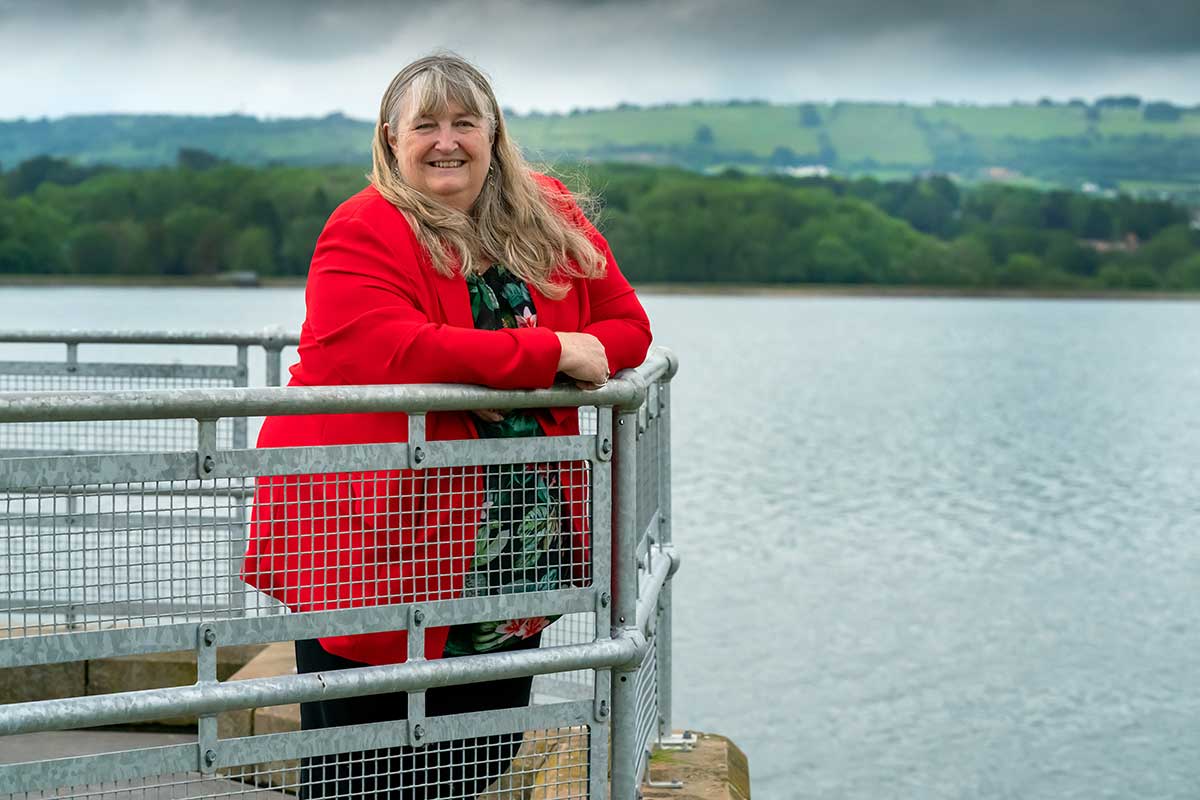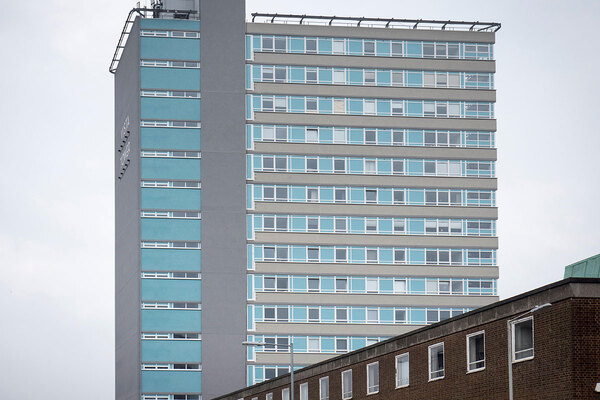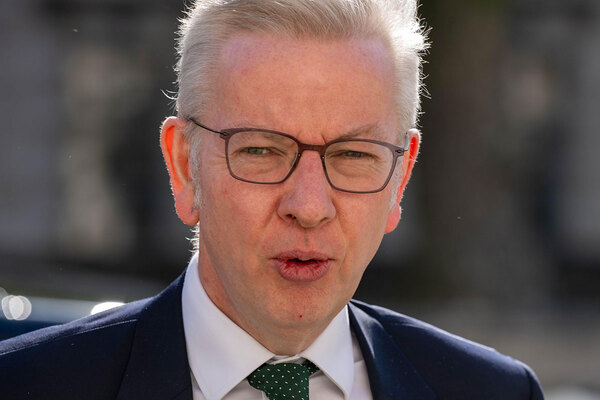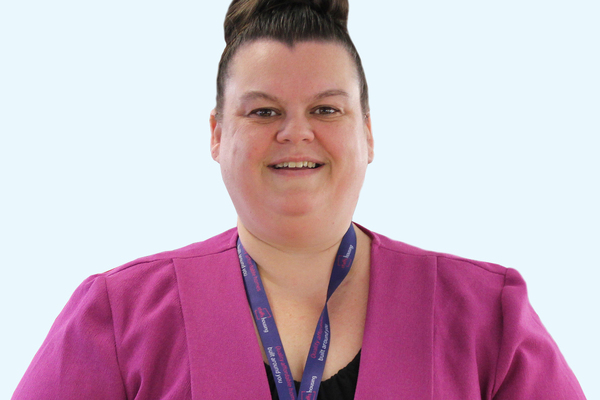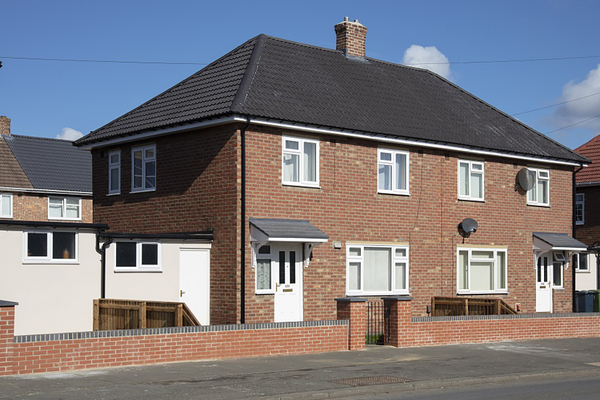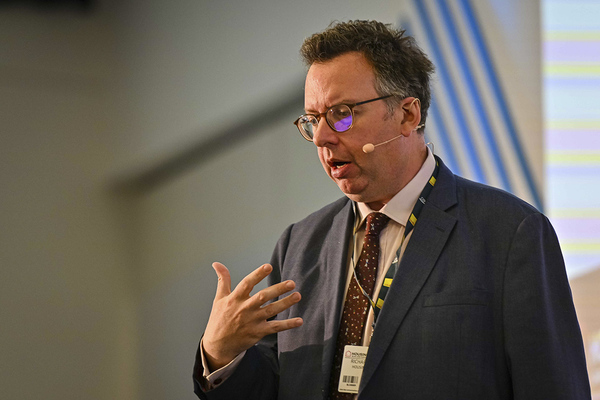Meet Julie James, Wales’ minister for climate change – which now includes housing
Julie James has a brand new job: Welsh minister for climate change, a newly created role that includes responsibility for housing. She spoke to Lucie Heath about her plans for the sector. Photography by Patrick Olner
Julie James is a busy woman. It is the first day of recess when Inside Housing catches up over zoom, but there is no break for Wales’ new climate change minister (housing is now a subset of this government department).
“The idea that recess is the holidays is one that we need to try and get across to the public is not true. What it means is that we’re not sitting in Cardiff,” she says.
In a far cry from the pomp and circumstance that often comes with meeting government ministers, Ms James is speaking to Inside Housing from her son’s bedroom in her home just outside of Swansea.
“Unless we can build the right sorts of housing for the future and unless we can decarbonise our existing homes, we’re not going to do anything about getting to net zero or reducing our impact on the planet”
Today she has already been out to visit flooding victims in a nearby village and is joining our chat from another zoom call that has overrun. She is only planning a week off politics this summer – in the Lake District.
It is no surprise that now is a busy time for Ms James. Following the Welsh election in May, when Welsh Labour was re-elected as the largest party, Ms James was appointed minister for climate change. Ms James previously served as minister for housing and local government, a role she has held since 2018.
Those in the Welsh sector that Inside Housing has spoken to appear happy about Ms James’ new role. “It’s great news that housing is firmly rooted within this department and is headed by a minister who gets the centrality of housing in delivering sound public policy, and who has overseen record levels of investment into social housing,” says Matthew Dicks, director at the Chartered Institute of Housing Cymru. However, Mr Dicks also echoes concerns that “housing will be competing with some big beasts, not least transport and energy”, in the need to tackle climate change.
Can Ms James promise housing will remain top of the agenda now that she has been put in charge of such a large and wide-ranging portfolio?
“Absolutely,” she responds firmly. “I was delighted that it was still included and it’s included because it’s absolutely front and centre of that debate, isn’t it? So unless we can build the right sorts of housing for the future and unless we can decarbonise our existing homes, we’re not going to do anything about getting to net zero or reducing our impact on the planet.”
Net zero target
Like the UK government, the Welsh government aims for Wales as a nation to be net zero by 2050, but has suggested a much shorter deadline for social housing. In 2019, it accepted a recommendation from a report it commissioned that all social homes should be EPC Band A, the highest energy efficiency rating possible, by 2030.
While this target has not yet been formally adopted, Ms James confirms that it is still something the government is considering. She points to the government’s Optimised Retrofit Programme, which is funding the retrofit of up to 1,000 social homes in order to pilot different approaches to decarbonisation.
“We’ve asked our social housing providers, who have between them every kind of house you can think of in their portfolio, to run programmes to tell us what works best for each type of house so that then we can roll that out across Wales in asking our social housing owners to bring that up to EPC A,” she explains.
“This isn’t about tinkering around the edges, this is about system change, because otherwise we will not make it and we have to make it”
After learning the lessons from the programme, Ms James says her department will look to roll out a wider social housing decarbonisation programme “in as short a timescale as we can manage”.
“We’ve got to save twice as much carbon in the next 10 years as we have in the last 30,” Ms James says. “This isn’t about tinkering around the edges, this is about system change, because otherwise we will not make it and we have to make it.”
The Welsh government is still in the process of working out exactly what grant funding the sector will be given to help decarbonise. Ms James says she is having “frank and honest conversations about what the trade-offs are”, for example when it comes to the number of homes being built. However, Ms James confirmed the government is still committed to delivering 20,000 affordable homes over the next five years, all of which will be built to low-carbon standards, with some even producing more energy than they use.
Decarbonisation is not the only huge challenge facing Ms James’ department. The Welsh government has also set itself the goal of ending homelessness, meaning that not only will there be no people sleeping rough, but also that it will end the use of temporary accommodation. There is much work that needs to be done if the government is to truly meet this goal.
For example, the government must fulfil its manifesto promise to build 20,000 social homes over the current parliamentary term to house the roughly 10,000 people living in temporary accommodation. Legislative changes will also need to be introduced so more people become eligible for housing support.
The pandemic has acted as a catalyst for the latter. In Wales, Ms James used the coronavirus regulations to effectively suspend ‘priority need’, the rule in England and Wales that means only people with a specific ‘vulnerability’ are given access to temporary accommodation, for example if they have children or a disability. Ms James says she has commissioned advice on what she needs to do in the short term to ensure Wales does not return to the priority need rules and will also be publishing a green paper on “a much longer-term system change”. While she stops short of promising that Wales will not have to temporarily return to the old pre-pandemic rules, she says she will do everything in her power to ensure that is not the case.
“We’re not going back to gatekeeping our services and telling people broadly, ‘Look, there’s nothing we can do for you, have a tent,’” she says.
On top of slowing climate change and ending homelessness, there is also the not-so-small matter of the building safety crisis to contend with.
“The idea that you can just wash your hands of it and people in Wales are not his problem. He’s the secretary of state for the UK. It’s not good enough”
Inside Housing is speaking with Ms James one week after she announced ‘phase one’ of her government’s Building Safety Fund, which will involve funding surveys on buildings over 11 metres tall. While this seems like a sensible first step, many will be asking why it has taken more than four years since the fire at Grenfell for such a scheme to be introduced.
“It’s just so immensely complicated,” Ms James says. “It’s been a top priority for a long time.”
Funding from Westminster
Paying for surveys is a welcome step, however many leaseholders in Wales will be disheartened to hear Ms James say the government may need “some scheme where the leaseholders do end up paying some money”.
When asked her reasoning for this, Ms James points her finger squarely at Westminster. “I just don’t have the money,” she says with an exasperated tone.
Blaming Westminster is often an easy out for politicians in the devolved governments, however Ms James may have a point. While the Welsh government has some limited taxation and borrowing powers, the majority of its funding comes from Westminster. When the UK government spends money on a policy that only impacts England, the Barnett formula is used to ensure that a share of funding is sent to the devolved nations.
However, Ms James is still waiting to hear how much money Wales will receive following the announcement of an additional £3.5bn for building safety in England back in February. She says her counterpart in Westminster, Robert Jenrick, told her she would have to wait until the next Spending Review for this information.
“They made the announcement. They should have sorted out what the devolved authorities would get when they made that announcement,” she says.
“The idea that you can just wash your hands of it and people in Wales are not his problem. He’s the secretary of state for the UK. It’s not good enough.
“I just don’t know how much money we will have available, or indeed if there’s any money available.”
Ms James could also choose to reallocate existing Welsh government funding to ensure leaseholders do not bear the cost of remediation. However, she points to our earlier conversation on homelessness as an explanation for why this is not a solution in her eyes. However, Ms James says her department is “pretty stretched”. “We’ve just been talking about homelessness. I’d be robbing that budget to make this budget,”
she says.
It is undeniable that Ms James faces huge competing priorities as she approaches this upcoming Senedd term, with each problem seeming as important and urgent as the next. That non-stop work ethic will come in handy if she is to grapple with them.
Julie James: CV
Julie James is a lawyer by trade – passing the bar to become a barrister in 1983, and working in various legal jobs including for Camden and Swansea councils.
In 2014, Ms James was appointed deputy minister for skills and technology and in 2016 took up the role of minister for skills and science, before being appointed leader of the house and chief whip. In December 2018, Welsh Labour leader Mark Drakeford made her minister for housing and local government.
Following the 2021 Welsh elections, Ms James was given the role of climate change minister, heading up a new ministry that includes housing.
